Ramses the Damned Read online
Page 18
“And then what?” Saqnos asked, brow furrowed, staring down at the schematics as if they had offended him.
“More of us will wait in the tunnel below, where we will at once confine her in a coffin. We shall seal her inside of it with our collective strength, and transport her to the distant opening near the pond. Close to there lies an access road. We’ll have taken her from the party before anyone notices.”
Saqnos smiled. “Very well,” he said. “Not such a bad plan. And a coffin, a coffin will terrify her, this newborn immortal.”
“Yes, Master. And with all light shut out, she will begin to weaken.”
Saqnos looked away, as if he could not make himself attend to these plans. “It will take time for darkness to weaken her,” he said.
“Yes, but she will be afraid. And she will know that she has been deprived of all light. And she will know that if she does not cooperate with us in future, she can be buried alive easily.”
Saqnos smiled wearily. “Yes. And you will be sure to tell her beloved Ramses the Damned that she is in a coffin.”
“That is our plan, Master,” said Burnham. “We will most certainly tell him that she has been sealed within a coffin. But we will not be keeping her in this coffin all that long. Only until we reach our final destination.”
Burnham smiled with delight as if inviting his master to smile with him.
“It is the Cage that we have in mind for her,” he said, and he could not stop himself from laughing. “Come, we will show you, Master.”
20
It was too much of a risk to follow at the heels of this group, so Bektaten commanded the cat up the grand staircase and out the window through which she’d come.
From the ledge, Bastet watched the group round the side of the massive house and begin their short trek towards the lone three-story building in the distance, the one they called the Cage. Once they were a safe distance away, Bastet descended the ash tree and began to follow them from the shadows.
They walked in silence, this man Burnham and Saqnos in the lead. Their shoes crunched the grass underfoot. The swells in the surrounding landscape were too modest to be called hills.
What an odd thing, this building they now approached. It was like the remnant of some town center otherwise destroyed.
The closer they came to it, the more some primal, defensive instincts awakened inside of Bastet.
Something lived within this building, something which stirred at their approach. She could smell it now. A strange mingling of musky scents. Somehow familiar, but seemingly out of place and therefore hard to pinpoint.
“What of the queen?” Burnham asked timidly. “How goes it with the queen?” he pressed.
“The queen sleeps,” Saqnos growled.
“But how do you know—”
“She sleeps,” insisted Saqnos as though he did not want to be questioned. “Or she has done herself in with her own poison. She thought she could spend eternal life posing as a healer and a trader. Wandering without end, in search of what, she did not know. A torment, this lack of ambition. This lack of clarity, it destroyed her. It has driven her into a tomb of her own making, I am sure. If not, we would have heard from her long before now.”
Ambition, clarity, so these were the twentieth-century words he now used for his avarice and greed, Bektaten thought. And he assumes me dead by my own hand because I did not share in his desire to clutch the entire world in one fist? And what sneering arrogance in his tone. Did he truly believe this, or did he simply desire to make his children believe it?
“But, Master, we can’t be sure that—”
“Speak no more of the queen, Burnham. She is my concern and always has been, not yours.”
They were only a few paces from the Cage. Its entrance was a single steel door; Bektaten was sure it was not original to the building.
The windows on all three floors were dark.
One after the other, the group filed inside. She waited until the last possible second.
Again the shock of a blind entry. But Bastet’s senses were assaulted by more than just the smell of animals within—a terrible, deafening sound. Howls, barks, growls; all of them echoing madly off the bare stone walls. There were no furnishings here; just a crude staircase without a railing. It was up these stairs she darted, to the thicket of shadows at the top, so she could turn and survey the group below.
The most notable feature in the room was a large steel grate in one corner of the floor. Perhaps it had once been the entrance to some basement. Now it seemed this basement had become a pit, and from it came this chorus of ferocious barks and howls.
Was it the cat’s presence that had driven these hounds to madness? Or did they react this way to all intruders?
One of the fracti stepped forward, a compact, elegantly dressed woman, her great mane of blonde hair fastened to the back of her head with a jeweled pin. She opened her handbag and dropped several raw steaks through the grate—four, five, six…Bektaten was startled to count eight in all. Not until the last one passed through the bars did the chorus of growls collapse into the moist sounds of a ravenous feast.
Eight steaks it took to quiet this horde. How many beasts were down there?
Stunned into silence, Saqnos watched the creatures eat.
“They are immortal,” Saqnos finally said. “You have given the half elixir to these…dogs?”
“Yes, Master,” Burnham answered. “And it has made them quite hungry. And quite strong. They were fighting beasts before, trained to hunt and kill. Now they can do both with incredible strength.”
“I can see this. I can see this, Burnham.” His words were almost a whisper. Was he pleased or revolted?
From her vantage point, she saw flashes of the dogs’ great chocolate-colored flanks as they wrestled and fought each other for scraps of meat. Massive heads, floppy ears. Mastiffs, these dogs. Great, powerful mastiffs given even greater strength by the half elixir.
The barks resumed. The steaks were gone. Eight steaks, gone in the span of a few seconds.
Monsters. In the bowels of this building meant for the idle habits of nobility long deceased, the children of Saqnos had bred monsters.
“You wish to put Julie Stratford in here?” Saqnos asked.
“Indeed, Father,” Burnham answered.
Impossible to tell if the others were as horrified as Bektaten was by this.
“Surely you do not expect her to die?” Saqnos asked.
“No. And that will be worse. She may fight them off for moments at a time. Perhaps she will recover from their wounds as we might, or as someone of your strength might. But the cycle of attack and defense and regeneration will be ceaseless. It will not end until we decide it should. It will not end until Mr. Ramsey tells us everything he knows.” And then this Burnham smiled primly at his brothers and sisters, and his father. “I have named them the hounds of Sisyphus.”
Monstrous, Bektaten thought. But she felt a strange flutter of anticipation in her own human chest as she watched this scene through Bastet’s unfailing eyes. What was this feeling? Was it hope?
It was an abominable crime, what this man Burnham proposed, what these people had created here. A form of torture that rivaled those of the Spanish Inquisition, an event that had sent her into the earth on a long sleep.
Did Saqnos feel the same way? Could he feel the same away? Was he even capable of such compassion? Did this explain his silence and the time he took to study the ravenous animals? Was he imagining some poor woman, immortal or not, fracti or pure, being forced to fight off these terrible beasts again and again? And if so, would this fantasy of barbarism resurrect the thoughtful, patient man she had known thousands of years before, before his thirst for the elixir transformed him into a man of pure appetite?
Reject this, Saqnos. Reject this plan. Throw its architect into the pit with his creations if you must so he may know the horror of his own actions. There is a part of you that knows no immortals or fracti should marshal their powe
r against any human in this way. You know this. You must.
“Burnham?”
“Yes, Master.”
Saqnos turned to his child and clapped his hands on the man’s shoulders. “This is a good plan, and you are a good servant.”
Everyone below suddenly spun and looked in her direction. The dogs erupted again. Only then did she realize her own anguish and fury had caused Bastet to yowl; this feline cry had given her location away.
She launched herself from the stairs, hit the stone between their scrambling legs, and raced out the open door. The fracti didn’t pursue. Neither did Saqnos.
To them, Bastet was just a feral cat whose secret lair had been disturbed. Perhaps they would later question why a cat would willingly draw so close to mad dogs, but for now, she had time to escape. She raced across the lawn, scaled the stone wall.
Then, just at the moment when Bastet saw the Landaulette in the shadows up ahead, Aktamu seemed to appear out of nowhere. He scooped her up in one arm.
Once Bektaten saw herself through Bastet’s eyes, Bektaten reached for her handkerchief. It was like groping in the dark, but she had practiced this movement several times earlier that night. She wiped her face clean of pollen. Gradually, the connection began to weaken.
For another minute or two she experienced the car’s movement as Bastet did, and then feeling returned to her own legs, and she felt once again the kiss of her dress shirt against her skin and the weight of her silk wrap against her shoulders and arms.
Once she found herself staring forward at the backs of the two men in the car’s front seat, Bektaten said, “It seems we have a party to attend.”
21
The Rutherford Estate
Alex Savarell followed his mother out onto the stone steps leading to the Rutherford Estate’s broad western lawn.
Edith Savarell, the Countess of Rutherford, was almost as tall as her son, her silver hair as lovely to him as her blonde hair had been years ago. Elegantly dressed in a soft belted jacket and narrow skirt, and with her hair exquisitely coiffed, she seemed to Alex a timeless beauty reborn.
Julie and Ramsey’s coming betrothal party was already the talk of London, twice mentioned in the society columns. A famous American author was scheduled to attend along with a string of other literary and artistic luminaries. In just a few days’ time, some of the wealthiest families in Britain would dot this very expanse.
In preparation, the estate, which had formed a terrible burden on their family for so long now, had been beautifully restored—what with Elliott’s steady stream of bank deposits from abroad, and Edith’s renewed enthusiasm. It had been brought back to life, and so had Edith, who strode ahead of him now, making broad sweeping gestures at the lawn before them as she described where the tents, tables, and chairs would go.
Over the past few weeks, the gardeners had managed to trim the walls of box hedges that ran the lawn’s length. They’d cleared away the vines that had threaded themselves through the surrounding trees over the past few years. Inside, the wood floors had been waxed and polished, the tapestries cleaned and the expansive windows shined to spotlessness, crystallizing every available view of the rolling green countryside. The dreary old Victorian wallpaper in the drawing room had been replaced by a new William Morris print, which made it appear as if the greenery surrounding the house had wandered inside and been somehow trimmed and tamed by all the elegant furnishings.
Edith was a handsome, strong-willed woman, an American heiress who had always been the perfect match for Alex’s father, a man prone to long trips and “fits of reclusiveness,” as she’d once described them. She had never complained of the family’s financial situation, which had consumed her own inheritance years ago, managing the household as best she could, and making the requisite excuses for Elliott’s often eccentric behavior.
A woman of greater emotional needs would have been unable to endure all this, Alex thought. And it delighted him to see his mother so irrepressibly happy. Though Alex knew nothing of women’s clothing or ornament, he knew this new jacket and skirt were expensive, fashionable—indeed her closets were bursting with such new clothing—and that the pearls she wore had been restored to her after years in a bank vault as security for debts now paid. This was good for his mother. She deserved this. She deserved to be proud and filled with social plans, of which the engagement party would certainly be only the beginning.
Was his father suffering from his usual rebellion now—his endless refusal to acknowledge the social demands placed on him? Did that explain Elliott’s travels all over Europe? It certainly didn’t explain the great sums of money he’d been sending home. He had mentioned casinos in his letter, yes. And there’d been a bit of gossip from old family friends who had spotted him in Baden-Baden.
There had been talk at the bank of an inadvisable land purchase in Africa. But with the money streaming in, no one had complained. Certainly Edith had not complained. She had continued to invest half of each surprising new deposit wisely for a time when perhaps her gambling husband would not have such luck. And she had managed all this, this magnificent restoration, on top of it.
“It’s somewhat odd Julie wants to have the party outside,” Edith said, turning to face her son. “It’s not quite the season yet, and won’t be for another few weeks.”
Alex had a reasonable guess, but he didn’t think it was his mother’s business. Julie was still strangely shy about the remarkable thing that had happened to her eyes. Out of doors, she’d have every excuse to wear those eccentric little sunglasses.
“But the weather seems well suited for it for now,” Alex said.
“For now, perhaps. But the temperature could plunge. And then what? Sweaters and blankets for all?”
“We’d simply move the party indoors, which looks just as impressive, thanks to all your hard work.”
“You give me too much credit,” said Edith. “With the right amount of funds, one can do anything. And besides, you’ve been quite a bit of help yourself, you know.”
“What you’ve undertaken here, it’s nothing short of a miracle, Mother. And a beautiful one at that.”
He looked back towards the house. The stone frames around its bay windows had been cleaned. They stood out like bare bone against brick walls that were now as bright a shade of red as they’d been in his youth. The Rutherford Estate had been restored to its original subtle Jacobean elegance.
“Perhaps,” his mother said. “But you know who all this work is really for, don’t you?”
“For Father? To lure him home, perhaps?”
Edith waved at the air in front of her as if to swat at a fly. “Nothing of the kind. I’m long past trying to rein in your father. And please. Don’t take that as a condemnation of the man. I love him, truly. But we are drawn by different tides, he and I. Who knows? Perhaps we live under different moons. At any rate, we seem to thrive as we are, so I’ve never questioned it and I won’t start now.”
Edith mounted the steps. He felt suddenly bashful and red-faced under the full force of his mother’s undivided attention.
“Besides, he’s doing his best to see to us. All this money he’s sent home. He claims it’s a sudden run of luck at the tables. But it must be a new business venture of some sort.”
“I can’t imagine.”
“Neither can I. But for now, let us just be grateful. And let us trust the wind to carry him as it always does. But let us also be clear about one thing. When it comes to this party, there’s only one person I’m doing it for, and that’s you, dear boy. Because you asked me to.”
“Indeed.”
“And I assumed you asked me to because it was important to you. Because something about the whole affair will allow you to let Julie go once and for all.”
“Maybe so, Mother. Maybe so.”
“Oh, and if you stay the night, there’s a gift for you. Enrico Caruso’s last recording of ‘Celeste Aida,’ which I’ve been told is rather marvelous. It’s inside for you, next to
the gramophone.”
Astonishing how these soft, loving words struck him like a blow to the gut. “Celeste Aida.” The opera. Cairo. The feel of her hand in his, turning, seeing her sliding into the box next to him, a magnificent jeweled creature, radiant with an energy that seemed almost otherworldly. And then burned. Devoured by fire.
“Alex? It’s the right one, isn’t it? Aida. Isn’t that the opera you all saw in Cairo? The one you’re so fond of?”
Urgency in his mother’s voice now. She clutched him by one shoulder, turned him to her. Tears in his eyes. How ghastly. He had never cried in front of his mother in this way, not since he was a small boy.
“Alex. What is it? It’s Julie, isn’t it? You haven’t truly—”
“No, Mother. That’s just it. I’ve already let Julie go entirely. That’s part of what ails me now.”
“So there is another?”
“In a manner of speaking.”
“Alex, I’m your mother. Let the only manner of speaking with which we address each other be the one that’s most truthful.”
“There is someone. Was someone, I should say. But it appears she’s slipped from my grasp as well.”
“Oh, dear. Someone you met on this Egyptian adventure about which you’ve said so little?”
“Yes.”
“I see.”
“Do you?”
He was so startled by the catch in his voice, he pulled away from her.
His vision blurred. It had been so long since tears had come to his eyes he was astonished by the physical consequences.
He stepped away from her quickly. Her arm lifted into the air behind him as if she thought she could draw him back merely with a gesture. She was still reaching out to him when he shot a shameful glance in her direction.
“It truly is a fearsome thing, isn’t it?” Alex asked. “To unguard one’s heart. One can’t know the terror of it until one fully does it, I imagine. They tell me she was a madwoman, you see. Some old friend of Mr. Ramsey’s. But she was…Well, I’d never met anyone like her, and I doubt I ever will again.”

 Interview with the Vampire
Interview with the Vampire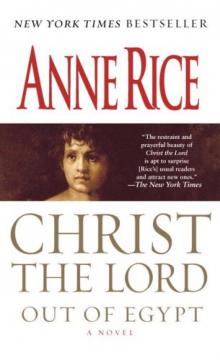 Christ the Lord: Out of Egypt
Christ the Lord: Out of Egypt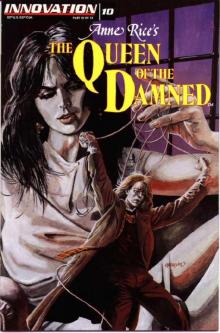 The Queen Of The Damned
The Queen Of The Damned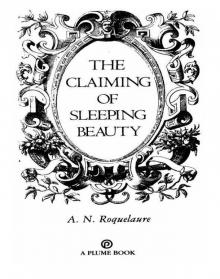 The Claiming of Sleeping Beauty
The Claiming of Sleeping Beauty Prince Lestat
Prince Lestat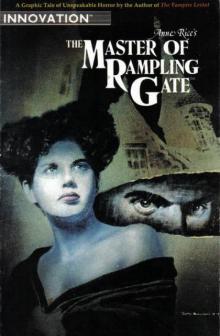 The Master of Rampling Gate
The Master of Rampling Gate The Vampire Lestat
The Vampire Lestat Blood Canticle
Blood Canticle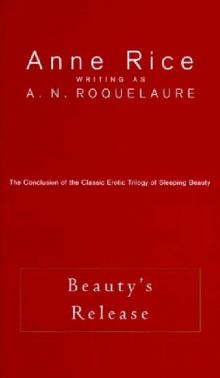 Beauty's Release
Beauty's Release Pandora
Pandora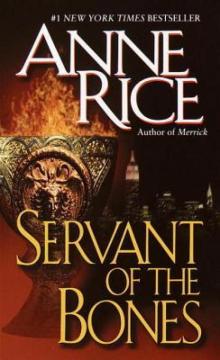 Servant of the Bones
Servant of the Bones Of Love and Evil
Of Love and Evil Beauty's Punishment
Beauty's Punishment Cry to Heaven
Cry to Heaven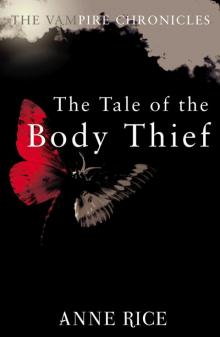 The Tale of the Body Thief
The Tale of the Body Thief The Witching Hour
The Witching Hour Memnoch the Devil
Memnoch the Devil Blackwood Farm
Blackwood Farm Beauty's Kingdom
Beauty's Kingdom Belinda
Belinda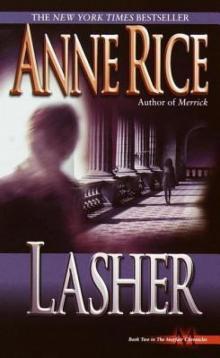 Lasher
Lasher Vittorio, the Vampire
Vittorio, the Vampire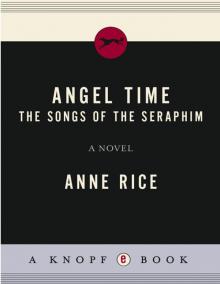 Angel Time
Angel Time Called Out of Darkness: A Spiritual Confession
Called Out of Darkness: A Spiritual Confession Blood And Gold
Blood And Gold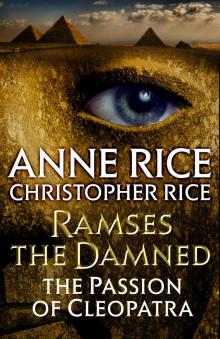 The Passion of Cleopatra
The Passion of Cleopatra Taltos
Taltos Exit to Eden
Exit to Eden Blood Communion (The Vampire Chronicles #13)
Blood Communion (The Vampire Chronicles #13) The Wolf Gift
The Wolf Gift The Wolves of Midwinter
The Wolves of Midwinter Prince Lestat and the Realms of Atlantis
Prince Lestat and the Realms of Atlantis The Ultimate Undead
The Ultimate Undead The Vampire Lestat tvc-2
The Vampire Lestat tvc-2 The Road to Cana
The Road to Cana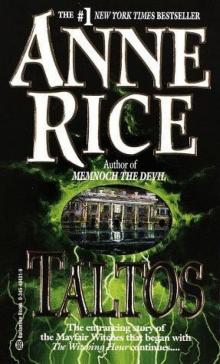 Taltos lotmw-3
Taltos lotmw-3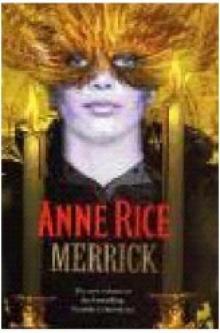 Merrick tvc-7
Merrick tvc-7 Called Out of Darkness
Called Out of Darkness Pandora - New Vampires 01
Pandora - New Vampires 01 Bllod and Gold
Bllod and Gold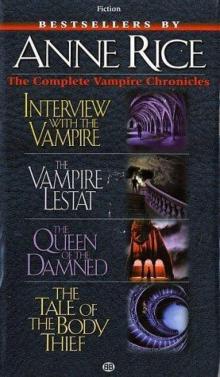 The Queen Of the Damned: Vampire Chronicles
The Queen Of the Damned: Vampire Chronicles The Sleeping Beauty Trilogy
The Sleeping Beauty Trilogy The Claiming of Sleeping Beauty b-1
The Claiming of Sleeping Beauty b-1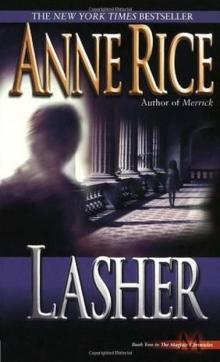 Lasher lotmw-2
Lasher lotmw-2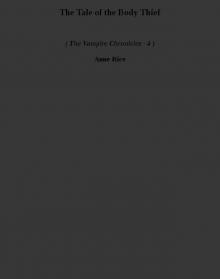 The Tale of the Body Thief tvc-4
The Tale of the Body Thief tvc-4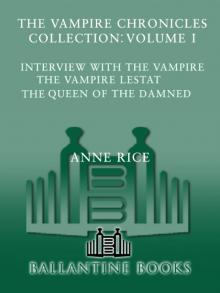 The Vampire Chronicles Collection
The Vampire Chronicles Collection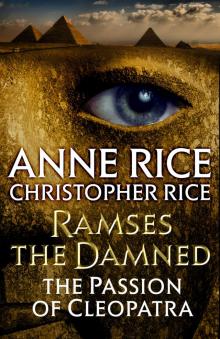 Ramses the Damned
Ramses the Damned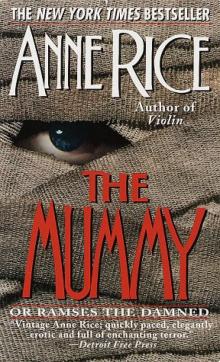 The Mummy - or Ramses the Damned
The Mummy - or Ramses the Damned Vittorio, The Vampire - New Vampires 02
Vittorio, The Vampire - New Vampires 02 The Vampire Armand tvc-6
The Vampire Armand tvc-6 Queen of the Damned tvc-3
Queen of the Damned tvc-3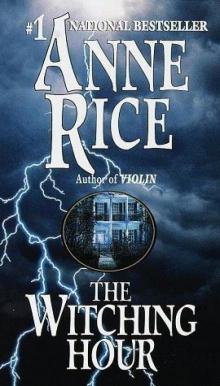 The witching hour lotmw-1
The witching hour lotmw-1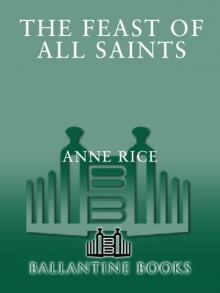 Feast of All Saints
Feast of All Saints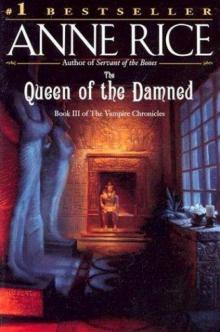 Queen of the Damned
Queen of the Damned The Wolves of Midwinter twgc-2
The Wolves of Midwinter twgc-2 The Mummy
The Mummy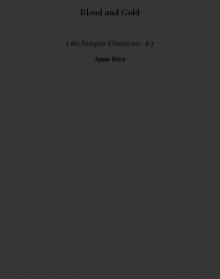 Blood and Gold tvc-8
Blood and Gold tvc-8 Blood Communion
Blood Communion Interview with the Vampire tvc-1
Interview with the Vampire tvc-1 Prince Lestat: The Vampire Chronicles
Prince Lestat: The Vampire Chronicles